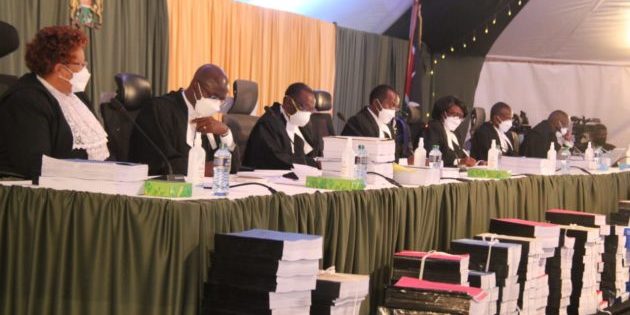NAIROBI, Kenya June 30 – The Independent Electoral and Boundaries Commission (IEBC) has accused the five Judges of the High Court who shot down the Building Bridges Initiative (BBI) process of advancing Judicial anarchy in the country when they delivered their May 14 ruling.
The electoral body in its submission before the seven-judge Bench of the Court of Appeal accused the High Court Judges of being subjective in their ruling and by extension ignoring the evidence that was presented before them.
“We can create judicial anarchy if courts of law make decisions in realm on matters of public law and courts of equal jurisdiction where this is brought to them and ignore that and say that I have a different opinion and in the meantime this decision realm has begun to change the manner in which the constitutional institutions operate,” former Attorney General Githu Muigai who is leading the electoral body’s legal team submitted.
Muigai was responding to the High Court ruling that faulted the electoral body for lacking quorum to conduct any electoral business when it verified BBI signatures.
The Judges ruled that the commission ought to have five commissioners and not three as currently constituted even though they agreed that it can conduct by-elections.
Muigai regretted that it was unfortunate for the Judges to ignore previous authorities that deemed the electoral body fit to conduct business.
Justice Wilfrida Okwany had in 2018 when determining a case which sought to block by-elections in Baringo South, North Kadem (ward) and in Bobasi Chache (ward) ruled that that three commissioners could still legally run the electoral body.
The petitioner then had argued that the Commission had no quorum hence cannot carry out any legal function or make key decisions, but Justice Okwany dismissed the case and found that the minimum commissioners cannot be a constant number.
“The judgement by the High Court cannot be allowed to stand because it violates so many fundamental tenets of good constitutional interpretation and management of constitutional conflict that if it were allowed to stand it would be the recipe for chaos,” Muigai told the Appeals bench.
He stressed that the five Judges of the High Court failed to appreciate the fact that IEBC is an independent body which draws its mandate from the Constitution.
He was categorical that the Judges overstepped on their mandate and issued advisory opinions “on hypothetical issues coached in the language that it did” which he said only ought to be rendered by the Supreme Court.
“As a result, it trampled upon the independence of IEBC. Independence is not for the judiciary alone, independence is for every constitutional institution,” he said.
While passionately pleading for the annulment of the High Court judgement, Muigai urged the Daniel Musinga-led Bench to allow the will of the people reign.
“A political process must be permitted to evolve politically and a judicial intervention commence itself where that process is complete and a legal product exist to which the judges then say that this is not allowed to stand,” he said.
Lawyer Eric Gumbo who also appeared on behalf of IEBC defended the commissions’ mandate of verifying the signatures which were collected in support of BBI.
“If it is a question of looking at verifying the signatures perhaps we would have said the best institution would be the DCI because they have the sufficient capacity to be able to do a forensic analysis of the signatures and any other material that is available to them hand written,” he said.
He however, insisted that IEBC is the sole custodian of the architecture of the electoral platform “specifically they are the custodian of the register of voters”.
He submitted that following the authentication of signatures of the 4 million Kenyans who supported the initiative, no individual has since complained that their name was captured without their consent despite the electoral body publishing the names on its website and the local dailies.
Gumbo noted that the judges erred in framing their own questions while questioning the mandate of IEBC in verifying the signatures despite the constitution being clear on the same.
“The judges were simply not objective,” he said.
The electoral body filed 12 grounds of appeal and categorized them on four thematic areas namely on the issues which were raised on quorum, voter registration, verification of signatures and public participation.

